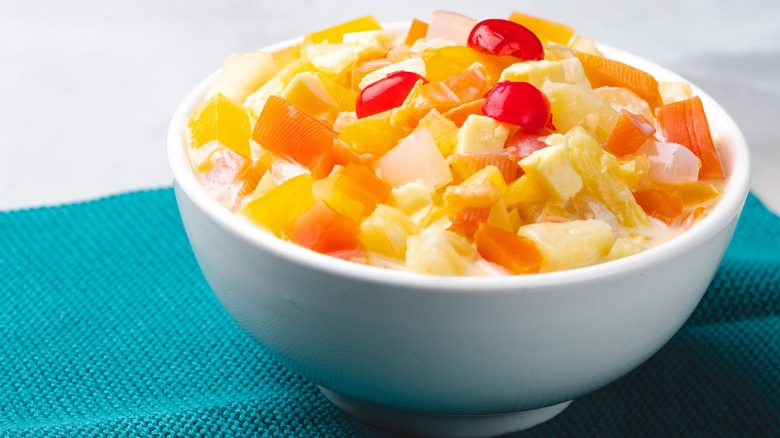What Makes Filipino Fruit Salad Unique?
There are a whole lot of cuisines that get short shrift when it comes to a wider global perception. Sure, just about everyone knows about the wonders of Japanese or Italian food, but how many Americans have been able to try authentic Burmese or Guatemalan cuisine? The proliferation of international cuisine is certainly getting better over time — witness the glorious rise of Korean food and the continuing popularity of the Vietnamese super-soup known as pho — but we still have a ways to go. One of those cuisines you should keep an eye out for is Filipino food.
There are plenty of signature Filipino dishes, but one in particular that needs more attention is Filipino fruit salad (also known as Pinoy fruit salad). You might be thinking you've had fruit salad before — but you probably haven't had it like this. It's made from a mix of different fruits, including tropical favorites such as pineapple and lychee. Perhaps most unique of all is the salad's use of sweetened condensed milk to amp up the dish's flavor and texture.
Sweetened condensed milk is the backbone of Filipino fruit salad
In many cultures, you'll occasionally see a fruit salad with some sort of sauce involved, like a light, sweet syrup, but maybe not sweetened condensed milk. Besides lending sweetness to Filipino fruit salad, it also bring a unique creamy richness to the mix. No matter what else is in the fruit salad, sweetened condensed milk is the universal glue holding the dish together.
You may come across recipes for this dish that call for heavy cream, light cream (basically a halfway point between half and half and heavy cream), or even sour cream. The fruit involved varies, too, with peaches, pears, grapefruit, pineapple, lychee, and coconut making some sort of appearance depending on your tastes.
Whatever fruit you go with when crafting Filipino fruit salad, make sure you use condensed milk as the dish's backbone. Oh, and make sure to drain the fruit of liquid, as any excess fruit juice will mess with the flavor and consistency of that creamy goodness.
Coconut gel and pineapple gel are great additions too
There's a couple other specialty ingredients that also work really for Filipino fruit salad — if you can get your hands on them. Nata de coco is a classic Filipino ingredient, but one you don't often see outside the Philippines itself. Created by fermenting coconut water, nata de coco's name literally translates to "coconut gel," and, well, it does what it says on the tin. It has a light coconut flavor and a jelly-like consistency to lend a great textural element to Filipino fruit salad without compromising its flavor. It's also a key component in halo-halo, one of the national beverages of the Philippines. Nata de piña is essentially the same thing, only made with pineapple juice. It can be hard to find either of these ingredients in the U.S., but their inclusion in the dish is well worth it. Check specialty grocery stores if you're determined to find either one.
We should always be striving to try new things and break new ground with our culinary experiences. Filipino fruit salad is a great way to do so, especially because it's an easy and delicious treat to make.


